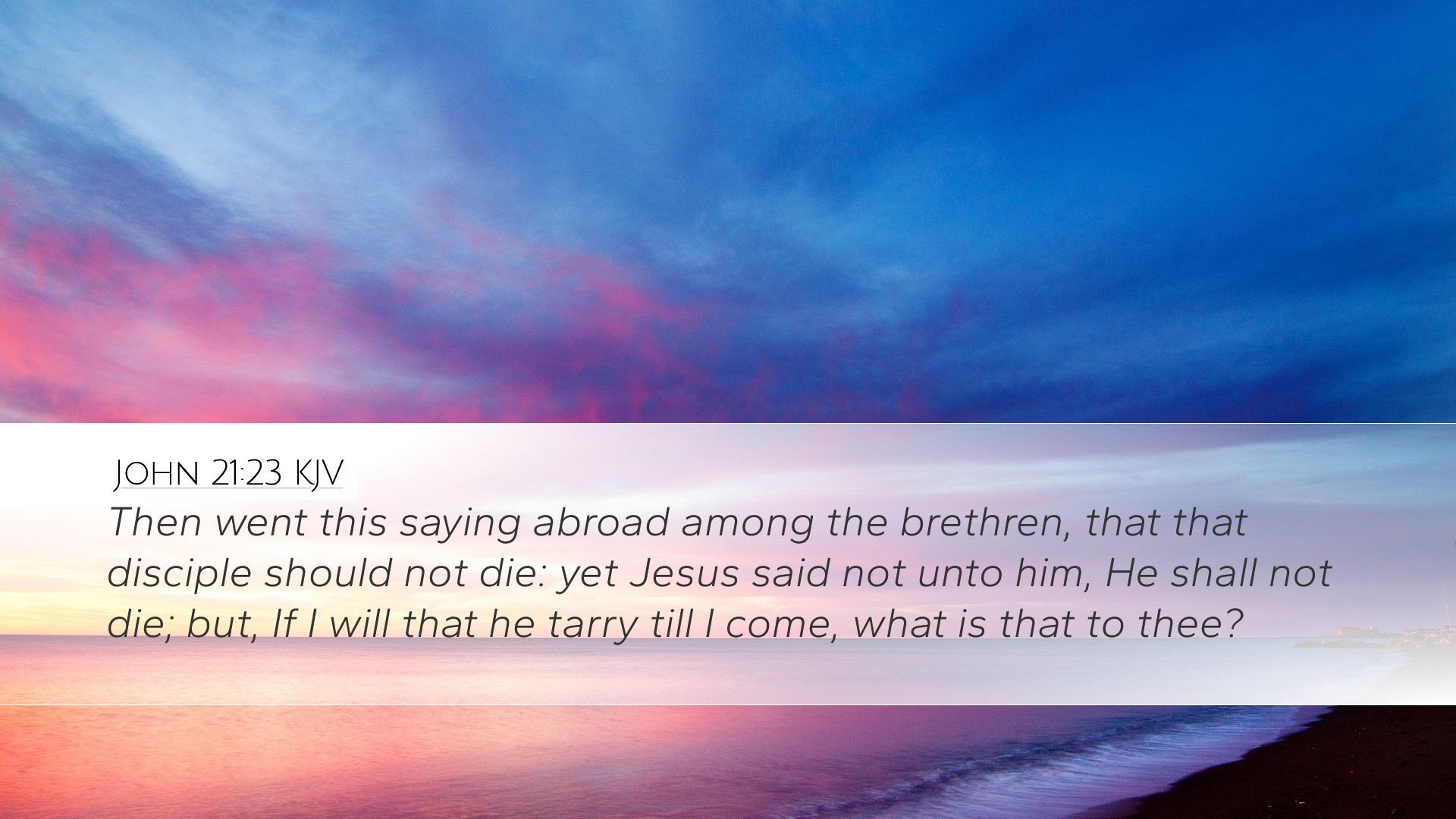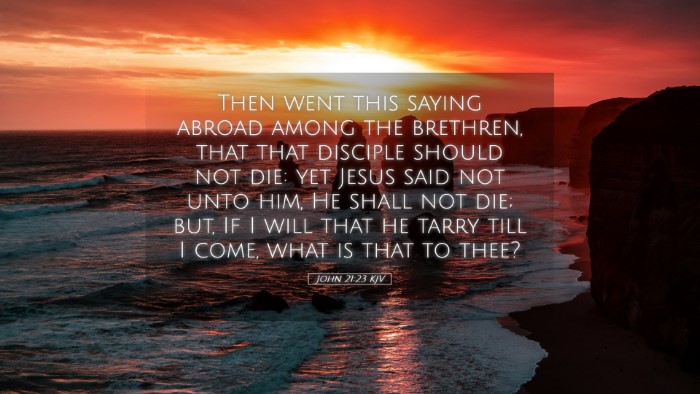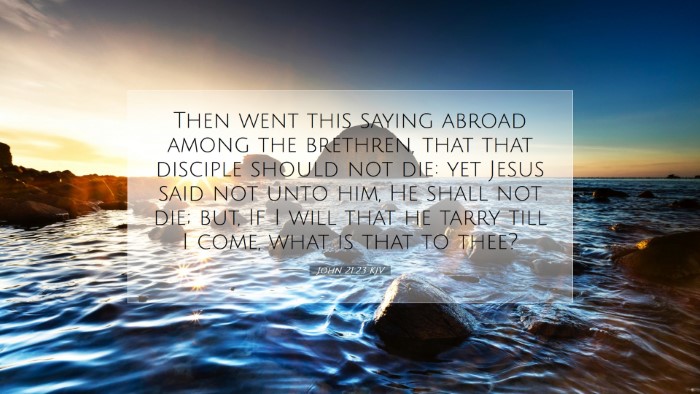Old Testament
Genesis Exodus Leviticus Numbers Deuteronomy Joshua Judges Ruth 1 Samuel 2 Samuel 1 Kings 2 Kings 1 Chronicles 2 Chronicles Ezra Nehemiah Esther Job Psalms Proverbs Ecclesiastes Song of Solomon Isaiah Jeremiah Lamentations Ezekiel Daniel Hosea Joel Amos Obadiah Jonah Micah Nahum Habakkuk Zephaniah Haggai Zechariah MalachiJohn 21:23
John 21:23 KJV
Then went this saying abroad among the brethren, that that disciple should not die: yet Jesus said not unto him, He shall not die; but, If I will that he tarry till I come, what is that to thee?
John 21:23 Bible Commentary
Commentary on John 21:23
John 21:23 states: "Then went this saying abroad among the brethren, that that disciple should not die: yet Jesus said not unto him, He shall not die; but, If I will that he tarry till I come, what is that to thee?" This verse is critical as it shapes our understanding of the apostolic community and the teachings of Christ regarding individual discipleship and purpose.
Contextual Analysis
This verse appears within the final chapter of the Gospel of John, where the resurrected Christ reinstates Peter (John 21:15-19) and provides profound insights about following Him. The reference to the "disciple whom Jesus loved" traditionally identified as John, signifies the intimate relationship he had with Jesus, but also brings to light the misconception that arose among early Christians regarding his longevity.
Insights from Matthew Henry
Matthew Henry elaborates on the implications of mistaken teachings propagated among the brethren. He emphasizes that Jesus did not definitively state that John would not die, but instead engaged in a hypothetical scenario that reflects on God's sovereignty and the mystery of His will. This cautionary note serves to remind believers that speculation about the timing and manner of an individual’s life and death should not deter one's own discipleship and focus on Christ.
- Emphasis on Followership: Henry underscores Jesus’ exhortation, "What is that to thee? Follow thou me." This direction urges believers to focus on their own paths rather than being consumed by others' circumstances.
- Misinterpretation of Christ's Words: He points out that the early disciples misinterpreted Jesus' words, showcasing the need for true understanding and interpretation of Scripture to avoid spreading inaccuracies.
- The Role of Divine Will: Henry highlights the sovereignty of Christ, noting that life and death are ultimately within God’s governance, and believers should trust His divine plan for each individual.
Reflections from Albert Barnes
Albert Barnes focuses on the miscommunication that led to the rumor among believers that John would not die. He reflects on how rumors, when left unchecked, can evolve into doctrine, affecting the faith and understanding of the community.
- Clarification of Misunderstanding: Barnes explains that although Jesus had not indicated John's permanence on earth, it became an unwarranted source of speculation, showing how early Christians wrestled with eschatological concepts.
- Importance of Accurate Evangelism: Barnes stresses the importance of accurately communicating the teachings of Christ, warning that misinterpretation can lead to misguided faith practices.
- Affirmation of Personal Faith: He points out that the directive to "follow me" reinforces the personal relationship and responsibility each disciple has towards Christ, irrespective of others' fates.
Contributions from Adam Clarke
Adam Clarke discusses the subtlety of Jesus' words, noting the ambiguous nature regarding John's future and how it reflects on God's purpose. Clarke emphasizes the importance of individual discernment in matters of faith.
- Speculative Theology: Clarke cautions against creating speculative theologies based on uncertain predictions, advocating for a faith rooted in the explicit teachings of Christ instead.
- Unity of Purpose: He reiterates that disciples should unify in their purpose to follow Christ, rather than becoming fragmented by individual destinies.
- Encouragement to Trust the Divine Plan: Clarke's commentary fosters a spirit of dependence on God's overarching plan, endorsing that every believer's life has intrinsic value and purpose regardless of longevity.
Theological Implications
The theological landscape of John 21:23 brings forth several important themes relevant to contemporary faith practices:
- Sovereignty of God: It affirms the belief that God is sovereign over life and death, urging believers to trust in His greater narrative.
- Call to Discipleship: Jesus' invitation to follow Him transcends personal concerns, emphasizing a commitment to His mission.
- Community Accountability: The spreading of false information stresses the need for accountability in teaching and interpretation within the Christian community.
Applications for Ministry and Study
This verse serves various applications for pastors, students, and theologians:
- Teaching Accuracy: Emphasize the importance of accurate theological teaching to prevent misinformation among congregations.
- Cultivating a Focused Ministry: Encourage ministers to focus on their call rather than being distracted by comparisons with others.
- Encouraging Personal Faith Journeys: Remind believers that their individual paths of faith are divinely ordained, and they should engage fully in their relationship with Christ.
Conclusion
John 21:23 reminds us of the importance of understanding Christ's teachings without distortion. By examining the insights from formidable theologians such as Matthew Henry, Albert Barnes, and Adam Clarke, we are encouraged to foster an environment of clarity, focus, and commitment to discipleship. Believers are called to follow Christ and engage in their divine purpose, thereby building a resilient and accurate faith community.


